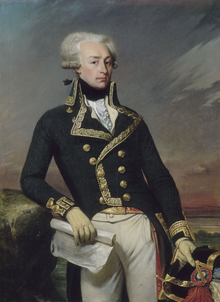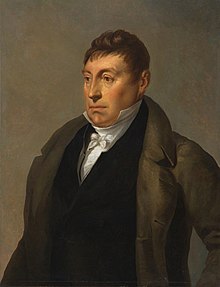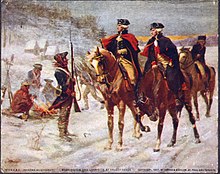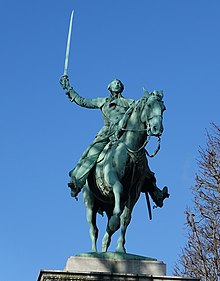Gilbert du Motier, Marquis de Lafayette
Appearance
(Redirected from Lafayette)

Marie-Joseph Paul Yves Roch Gilbert du Motier, Marquis de Lafayette (6 September 1757 – 20 May 1834), often referred to simply as Lafayette, was a French and American military officer and aristocrat who participated in the American Revolution as a general and served in the Estates General and the subsequent National Constituent Assembly in the early phases of the French Revolution.
Quotes
[edit]

- I read, I study, I examine, I listen, I reflect, and out of all of this I try to form an idea into which I put as much common sense as I can. I shall not speak much for fear of saying foolish things; I will risk still less for fear of doing them, for I am not disposed to abuse the confidence which they have deigned to show me. Such is the conduct which until now I have followed and will follow.
- Letter to his father-in-law, the Duc d'Ayan (4 December 1776), as quoted in George Washington's Generals and Opponents: Their Exploits and Leadership (1994) by George Athan Billias, p. 219
- Humanity has gained its suit; Liberty will nevermore be without an asylum.
- Letter to friends (1780), published in Memoirs de La Fayette Vol. II, p. 50, quoted in Martin's History of France : The Decline of the French Monarchy (1866) by Henri Martin, Vol. II, p. 418
- Variant translations:
- Humanity has gained its suit : Liberty will never more be without an asylum.
- As quoted in Oration on the Hundredth Anniversary of the Surrender of Lord Cornwallis to the Combined Forces of America and France: At Yorktown, Virginia, 19th October, 1781: Delivered at Yorktown, 19th October, 1881 (1881), by Robert Charles Winthrop, p. 53
- Humanity has won its battle. Liberty now has a country.
- As quoted in French Contributions to America (1945) by Edward Fecteau
- Liberty consists in the freedom to do everything which injures no one else; hence the exercise of the natural rights of each man has no limits except those which assure to the other members of the society the enjoyment of the same rights.
- Declaration of the Rights of Man (1789)
- True republicanism is the sovereignty of the people. There are natural and imprescriptible rights which an entire nation has no right to violate, just as national sovereignty is above the secondary agreements of the government.
- Speech (3 January 1834), quoted in Lafayette in Two Worlds: Public Cultures and Personal Identities in an Age of Revolutions (1999), p. 256
- An irresistible passion that would induce me to believe in innate ideas, and the truth of prophecy, has decided my career. I have always loved liberty with the enthusiasm which actuates the religious man with the passion of a lover, and with the conviction of a geometrician. On leaving college, where nothing had displeased me more than a state of dependance, I viewed the greatness and the littleness of the court with contempt, the frivolities of society with pity, the minute pedantry of the army with disgust, and oppression of every sort with indignation. The attraction of the American revolution transported me suddenly to my place. I felt myself tranquil only when sailing between the continent whose powers I had braved, and that where, although our arrival and our ultimate success were problematical, I could, at the age of nineteen, take refuge in the alternative of conquering or perishing in the cause to which I had devoted myself.
- Letter to the Bailli de Ploën, as quoted in Recollections of the Private Life of General Lafayette (1835) by Jules Germain Cloquet, Vol. I, p. 24
- I would never have drawn my sword in the cause of America, if I could have conceived that thereby I was founding a land of slavery.
- As quoted in a letter by Thomas Clarkson (3 October 1845), published in The Liberty Bell (1846), p. 64
Disputed
[edit]- If the liberties of the American people are ever destroyed, they will fall by the hands of the Romish clergy.
- Lafayette, himself was a Roman Catholic and a considerably devout catholic in the later stages of his life, There seems to be no evidence that he might conceivably have said something translatable as this, the earliest source yet found for this is an anti-catholic pamphlet The Future Conflict : An Address, (1878), by Order of the American Union, p. 20, without any citation of original sources. It has also been quoted as: "If the liberties of the American people are ever destroyed, they will fall by the hands of the clergy."
Quotes about Lafayette
[edit]


- Pronounce him one of the first men of his age, and you have yet not done him justice. Try him by that test to which he sought in vain to stimulate the vulgar and selfish spirit of Napoleon; class him among the men who, to compare and seat themselves, must take in the compass of all ages; turn back your eyes upon the records of time; summon from the creation of the world to this day the mighty dead of every age and every clime — and where, among the race of merely mortal men, shall one be found, who, as the benefactor of his kind, shall claim to take precedence of Lafayette?
- John Quincy Adams in an address to the US Congress (31 December 1834)
- Born and educated in the highest order of feudal Nobility, under the most absolute Monarchy of Europe, in possession of an affluent fortune, and master of himself and of all his capabilities at the moment of attaining manhood, the principle of republican justice and of social equality took possession of his heart and mind, as if by inspiration from above. He devoted himself, his life, his fortune, his hereditary honors, his towering ambition, his splendid hopes, all to the cause of liberty. He came to another hemisphere to defend her. He became one of the most effective champions of our Independence; but, that once achieved, he returned to his own country, and thenceforward took no part in the controversies which have divided us. In the events of our Revolution, and in the forms of policy which we have adopted for the establishment and perpetuation of our freedom, Lafayette found the most perfect form of government. He wished to add nothing to it.
- John Quincy Adams in an address to the US Congress (31 December 1834)
- When the principle of hereditary dominion shall be extinguished in all the institutions of France; when government shall no longer be considered as property transmissible from sire to son, but as a trust committed for a limited time, and then to return to the people whence it came; as a burdensome duty to be discharged, and not as a reward to be abused; when a claim, any claim, to political power by inheritance shall, in the estimation of the whole French people, be held as it now is by the whole people of the North American Union — then will be the time for contemplating the character of Lafayette, not merely in the events of his life, but in the full development of his intellectual conceptions, of his fervent aspirations, of the labors and perils and sacrifices of his long and eventful career upon earth; and thenceforward, till the hour when the trump of the Archangel shall sound to announce that Time shall be no more, the name of Lafayette shall stand enrolled upon the annals of our race, high on the list of the pure and disinterested benefactors of mankind.
- John Quincy Adams in an address to the US Congress (31 December 1834)
- Lafayette avoided the factions jealous of Washington because he recognized that Washington was the Revolution and that should he be reduced in power or replaced, the whole cause would collapse. … Washington was a shrewd judge of character and never would have warmed to Lafayette if he had been only a superficial ingratiating romantic.
Lafayette scrupulously looked after his men, spending his own money when Congress failed to provide them necessities. Nor was he backward in suggesting to Washington certain changes and innovations from French military practice.- George Athan Billias, in in George Washington's Generals and Opponents : Their Exploits and Leadership (1994), p. 219 - 220
- Ambition, as that passion is generally understood,— a strong desire to rise above others, to occupy the first place, — formed no part of Lafayette's character. In him the passion was nothing more than a constant and irresistible wish to do good.
- Jules Germain Cloquet, in Recollections of the Private Life of General Lafayette (1836), Vol. I, p. 23
- Lafayette valued reputation and glory, but cared little for the power that generally results from them. Having one day been asked who was in his opinion the greatest man of this age: "In my idea," replied he, "General Washington is the greatest man, for I look upon him as the most virtuous."
- Jules Germain Cloquet, in Recollections of the Private Life of General Lafayette (1836), Vol. I, p. 24
- No one deserves more than he the esteem which he enjoys here. He is a prodigy for his age, full of courage, spirit, judgment, good manners, feelings of generosity and of zeal for the cause of liberty on this continent.
- Baron Johann de Kalb, writing to the French War Department, as quoted in George Washington's Generals and Opponents : Their Exploits and Leadership (1994) by George Athan Billias, p. 219
- Lafayette is a young man of royal birth, with liberal politics and what Jefferson later called "a canine appetite for fame." Someone said he was "a statue in search of a pedestal." But he was intoxicated with, [had] a rather theoretical love of, liberty. It was theoretical because liberty wasn't known to many Europeans. [Lafayette] was a great romantic and he fell in love with America, the concept of America that the French had. This wild new world where you could start the world over, to use Tom Paine's phrase.
- Lafayette, nous voilà!
- Lafayette, we are here!
- Charles E. Stanton, an aid to General John J. Pershing in an address before the tomb of Lafayette (4 July 1917). Pershing is often credited with the remark, sometimes upon arriving in France with the American Expeditionary Force, but he himself stated: "Many have attributed this striking utterance to me and I have often wished that it could have been mine, but I have no recollection of saying anything so splendid. I am sure that those words were spoken by Colonel Stanton and to him must go the credit for coining so happy and felicitous a phrase."
- Lafayette, we are here!
- Despite all of his face-smashing asskicking prowess, perhaps the Marquis de Lafayette's greatest contribution to the American Revolution was his ability to get the French Crown off its ass to help bail our shit out. … The Marquis de Lafayette is probably one of the only Frenchmen to ever be declared a national hero in the United States — a statistic that is badass in and of itself. Roughly 40 cities in America are named after him, he has numerous statues across the country, and he is fondly remembered as a motherfucker who helped us gain our independence from our oppressive British masters. He was also a goddamned badass who kicked nuts, refused to let anybody stand in the way of his mission to bring freedom to the common man, and bravely fought for liberty and equality — even when it didn't pay dick.
- The Marquis de Lafayette is extremely solicitous of having a command equal to his rank. I do not know in what light Congress will view the matter, but it appears to me, from a consideration of his illustrious and important connexions, the attachment which he has manifested for our cause, and the consequences which his return in disgust might produce, that it will be advisable to gratify him in his wishes; and the more so, as several gentlemen from France, who came over under some assurances, have gone back disappointed in their expectations. His conduct with respect to them stands in a favorable point of view; having interested himself to remove their uneasiness, and urged the impropriety of their making any unfavorable representations upon their arrival at home; and in all his letters he has placed our affairs in the best situation he' could. Besides, he is sensible; discreet in his manners; has made great proficiency in our language; and, from the disposition he discovered at the battle of Brandywine, possesses a large share of bravery and military ardor.
- George Washington, in a letter to Congress (1 November 1777), as quoted in Journal of the House of Representatives of the United States Vol. 23, Issue 2 (1835), p. 665
External links
[edit]- Works by Gilbert du Motier, Marquis de Lafayette at Project Gutenberg
- The Cornell University Library Lafayette Collection
- The Marquis de Lafayette collection, Cleveland State University
- Marie Joseph Paul Yves Roch Gilbert du Motier, Marquis de Lafayette Collection, Library of Congress
- Lafayette College, The Marquis de Lafayette Collections
- Martha Joanna Lamb, Lafayette letters from prison, The Magazine of American History with Notes and Queries, pp. 353-376


